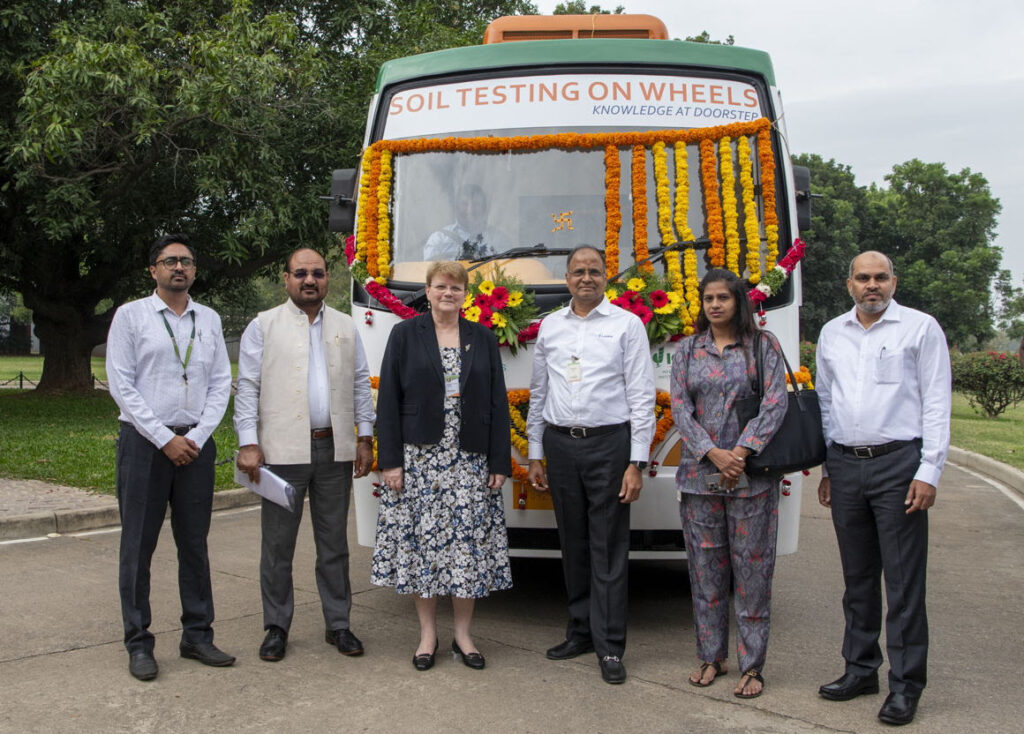The International Crops Research Institute for the Semi-Arid Tropics (ICRISAT) marked World Soil Day 2023 with the inauguration of ‘Technology on Wheels’, a new initiative designed to promote sustainable soil and water management practices among farmers.

This year’s World Soil Day theme, “Soil and Water: A Source of Life,” holds particular relevance for drylands, where there is a deficit of both water and soil nutrients.
Cognizant of this inherent challenge, and the fact that soil and water account for 95% of global food production, ICRISAT remains steadfast in addressing the urgent challenges posed by land degradation and the decline in soil health—particularly in the context of climate change.
The newly launched ‘Technology on Wheels’, mobile soil and water testing laboratory, reflects ICRISAT’s commitment to bridge the gap between scientific advancements and in-the-field implementation.
Developed in partnership with the Laurus Charitable Trust, the mobile facility will operate in the Medchal-Malkajgiri districts of Telangana, India, and offer on-site soil testing services to farmers, promoting the adoption of regenerative agricultural practices at the grassroots level.
Speaking at an event to mark the occasion, Director General of ICRISAT, Dr Jacqueline Hughes, highlighted ICRISAT’s longstanding efforts to bolster soil health across Asia and Africa by advancing scientific knowledge and fostering awareness on the interconnectedness between soil and water for resilient and sustainable agrifood systems.
“We recognize that science and society, particularly farmers through their farming practices, help preserve life on Earth. At ICRISAT, we aim to provide innovative, easily implementable solutions that safeguard soils and secure water for our present and future,” Dr Hughes shared.
ICRISAT’s digitalized interventions include localized soil testing and soil-test-based crop management technologies, guiding farmers in crop and variety selection, and offering suitable technologies and inputs to enhance productivity, efficiency, and system profitability.
Mr VV Ravi Kumar, Executive Director and Chief Financial Officer at Laurus Labs, commended the experts at ICRISAT for their unwavering support in taking this initiative to the next level.
“This partnership epitomizes the core values of the Laurus Charitable Trust’s initiatives: education, environment, and health. Through ‘Technology on Wheels’, we aspire to elevate the lives of our farmers, enriching their livelihoods through empowerment and education,” Mr Kumar said.
Dr ML Jat, Global Research Program Director for Resilient Farms and Food Systems, added, “Through collaborations, new science and advanced tools, including the digital soil information using advanced Geographic Information System and artificial intelligence, ICRISAT acknowledges the intricate link between soil health and water quantity and quality.”
Dr Pushpajeet L Choudhari, Manager at the Charles Renard Analytical Laboratory at ICRISAT and Chair of the Food and Agriculture Organization of the United Nations’s Asian Soil Laboratory Network (SEALNET), emphasized ICRISAT’s unique value as a leading partner for the Soil Health Monitoring Framework in Asia and Africa.
He highlighted the Framework’s aim to strengthen collaborations between ongoing projects, government initiatives, and National Agricultural Research System programs, fostering awareness through partnerships and amplifying the impact of initiatives on the ground.
As a recognized global leader in landscape management and water conservation practices, especially in the drylands, which constitute half of terrestrial ecosystems, ICRISAT continues to advocate for and work towards the implementation of sustainable agricultural practices.
The Institute is also renown for pioneering research on millets, a crop pivotal for water and soil conservation, with efforts concentrated in the drylands of Asia and Africa—regions grappling with nutrient-depleted soils and water scarcity.